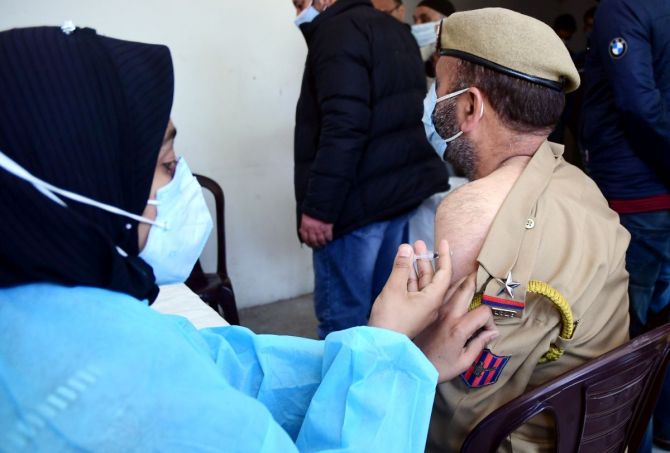There was the mistaken belief that there was no risk of a second wave anytime soon, reports Subhomoy Bhattacharjee.

The central government's vaccine orders have been abysmally low even as pharma companies race to ramp up output to contain the fresh spread of coronavirus, once seemingly in retreat.
The government only placed orders for 66 million doses in the initial stage, meant to vaccinate 30 million health care and front line workers, who started receiving their first shots from January 16, 2021. The orders were placed with the Serum Institute of India and Bharat Biotech.
The health ministry estimated that these two groups of workers would need about 66 million doses, taking into account wastage.
The procurement cost for the first lot of vaccines -- about Rs 1,300 crore (Rs 13 billion) -- was paid for using the PM Cares Fund. According to the Fund Web site, it has received contributions of Rs 3,076.62 crore (Rs 30.76 billion) as of FY20.
The government used the Fund to pay for the vaccine to obviate the need for a long-winded authorisation that is bound to take place when money is spent from the Consolidated Fund of India.
There were two reasons behind the 66 million doses order, said a key government official.
The first was the mistaken belief that there was no risk of a second wave anytime soon.
The second was the memory of a similar order placed a decade ago with these same pharma companies. The case has wound its way to the courts and has been the subject of adverse reports from the auditor and so on. The sum involved was a puny Rs 30 crore (Rs 300 million).
Both factors led the health ministry to be somewhat cautious in signing the deal with the pharma firms.
Consequently, it had placed an order this time for supply of 56 million Covishield vaccines from Serum and 10 million from Bharat Biotech.
The supply was to come in from both companies in stages, but within May this year.
So even though Serum had received the emergency authorisation by January 3 and supplies had begun soon thereafter, it too had not begun to ramp up supplies.
The reluctance of the health care and front line workers to get the jab also contributed to the lower estimates.
The earlier vaccine case between the government and pharma companies dates back to another public health emergency scare -- the swine flu in 2009.
Once the flu spread in India, the government reached out to domestic firms to prepare a vaccine.
These vaccines were to be used as a stockpile to meet emergencies.
While supplies were to be made within three months from the date of the order -- by December 2009 -- the firms delayed the consignments.
The firms, including these two and Panacea Biotech, had advised the government they would need more time than the stipulated three months to complete the clinical trials.
By the time the orders arrived, the scare had passed, forcing the government to cancel the order and dealing a blow to the firms, which had to destroy the vaccines.












 © 2025
© 2025